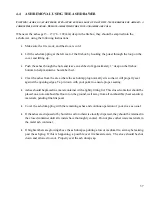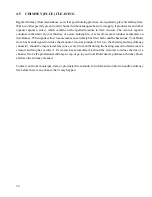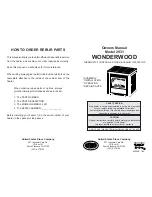
26
2.3 CHIMNEY CONNECTOR
Your chimney connector (commonly called stove pipe) and chimney must have the same diameter as the
stove’s exhaust outlet. The stove pipe must be made of aluminized or cold roll steel with a minimum 24-
gauge thickness (0.021" or 0.53 mm). It is strictly forbidden to use galvanized steel.
The following recommendations may be useful for the installation of your chimney connector:
Your chimney connector should be assembled in such a way that the male end (crimped) faces down
to prevent creosote dripping outside the joints. Attach each of the sections to one another with three
equidistant metal screws. Also use three equidistant metal screws to attach the connector to the
stove’s exhaust collar. See Figure 2.3 (A) and Figure 2.3 (B).
The pipe must be short and straight. All sections installed horizontally must slope at least ¼ inch per
foot, with the upper end of the section toward the chimney. See Figure 2.3 Detail B.
To insure a good draft, the total horizontal length of the connector should never exceed 8' to 10' (2.4
to 3.04 m). In the case of vertical installation, the total length of the connector can be much longer
and connected without problem to the chimney at the ceiling level.
There should never be more than two 90 degrees elbows in the whole connector and chimney system.
Never start with a 90
o
elbow. Always go up vertically for at least 2 feet from the flue spigot before
using a 90
o
elbow.
The connector must not pass through any combustible material, nor may it pass through a concealed
space (such as an attic, roof space, or closet). If passing through a wall, ceiling, or into a masonry
chimney, use either chimney components listed for that specific use, or means acceptable to local
authorities having jurisdiction over the installation.
Installation of a "barometric draft stabiliser" (fireplace register) on a connector is not recommended.
FIGURE 2.3 (A) Connecting Sections















































